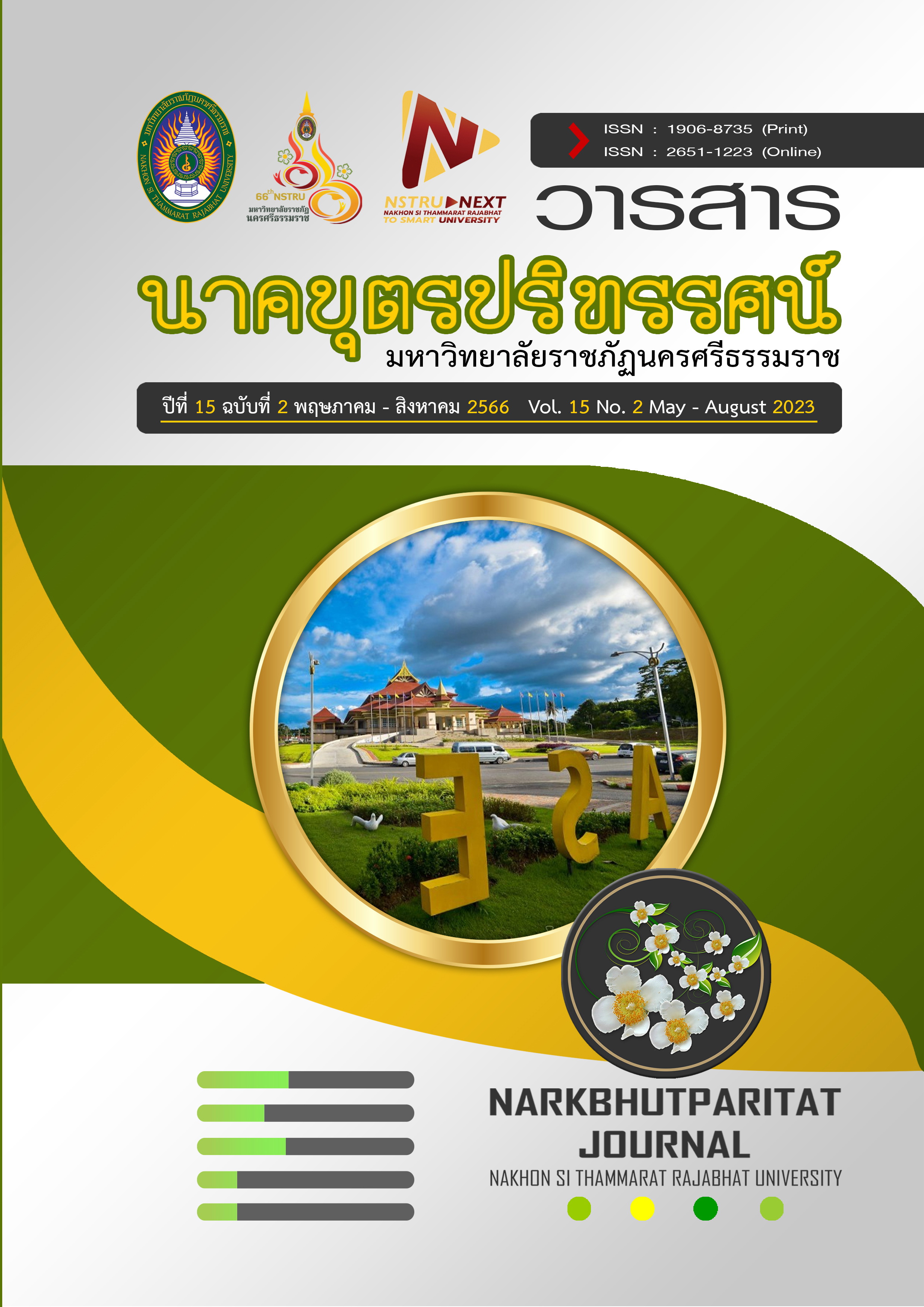ความสัมพันธ์ระหว่างความสามารถขององค์การและความรับผิดชอบต่อสังคม ของอุตสาหกรรมสีเขียวได้รับการรับรองในประเทศไทย
Main Article Content
บทคัดย่อ
งานวิจัยนี้มีวัตถุประสงค์เพื่อศึกษาความสามารถขององค์การและความรับผิดชอบต่อสังคมของอุตสาหกรรมสีเขียวที่ได้รับการรับรองในประเทศไทย และศึกษาความสัมพันธ์ความสามารถขององค์การและความรับผิดชอบต่อสังคมของอุตสาหกรรมสีเขียวที่ได้รับการรับรองในประเทศไทย ใช้วิธีการวิจัยแบบผสมผสาน กลุ่มตัวอย่างคือผู้ให้ข้อมูลสำคัญ ได้แก่ ผู้บริหารเชิงปฏิบัติการหรือผู้รับผิดชอบทางด้านสิ่งแวดล้อมของโรงงานอุตสาหกรรมที่ได้รับการรับรองอุตสาหกรรมสีเขียว มีประสบการณ์ด้านสิ่งแวดล้อมไม่น้อยกว่า 5 ปี จำนวน 12 คน และกลุ่มตัวอย่างผู้ประกอบการโรงงานอุตสาหกรรมเกี่ยวกับอาหารและเกษตรจำนวน 9 กลุ่ม จากกระทรวงอุตสาหกรรม จำนวน 438 โรงงาน โดยการสุ่มกลุ่มตัวอย่างใช้วิธีการเลือกลุ่มตัวอย่างแบบไม่อาศัยทฤษฎีความน่าจะเป็น วางแผนการสุ่มตัวอย่างแบบหลายขั้น 3 ขั้นตอน ได้แก่ การเลือกกลุ่มตัวอย่างแบบเจาะจง การเลือกกลุ่มตัวอย่างแบบโควต้าและการสุ่มเลือกตัวอย่างแบบตามความสะดวก เครื่องมือที่ใช้ในการวิจัย ได้แก่ แบบสัมภาษณ์เชิงลึก แบบสอบถามความสามารถขององค์การและความรับผิดชอบต่อสังคมมีค่าความเชื่อมั่นที่ 0.971 สถิติที่ใช้ในการวิเคราะห์ข้อมูล ได้แก่ ค่าเฉลี่ย ค่าร้อยละ ส่วนเบี่ยงเบนมาตรฐาน และค่าสัมประสิทธิ์สหสัมพันธ์แบบเพียร์สัน ผลการวิจัยพบว่า
1) แนวทางการจัดการด้านสิ่งแวดล้อมของโรงงานอุตสาหกรรมจะต้องมีการร่วมมือกันระหว่างภาครัฐและเอกชนในการดำเนินการสร้างจิตสำนึกของผู้มีส่วนเกี่ยวข้องทุกฝ่ายในด้านสิ่งแวดล้อม กระตุ้นให้มีการนำประเด็นปัญหาสิ่งแวดล้อม มากำหนดนโยบายตามความสามารถขององค์การ 2) ความสามารถขององค์การมีความสัมพันธ์ทางบวกขนาดปานกลางกับความรับผิดชอบต่อสังคมด้านเศรษฐกิจ ด้านกฎหมาย ด้านจริยธรรม และด้านการให้เพื่อสังคมมีนัยสำคัญทางสถิติที่ระดับ 0.01
Article Details

อนุญาตภายใต้เงื่อนไข Creative Commons Attribution-NonCommercial-NoDerivatives 4.0 International License.
เอกสารอ้างอิง
Boonchaisuk, P. (2013). Creative industries Driving the Thai economy stronger. Retrieved 2020 December, 1, from http://library.dip.go.th/multim6/edoc/2556/22145.pdf. (in Thai)
Bunprom, P. (2010). Tools for Sustainable Environmental Management. Suthiparithat Journal, 24(73), 169-184. (in Thai)
Economic Intelligence Center. (2016). Catch the Thai industrial direction in 2016. Bangkok: The Siam Commercial Bank Public Company Limited. (in Thai)
Hair, J. F., Black, W. C., Babin, B. J., Anderson, R. E. & Tatham, R. L. (2006). Multivariate data analysis (Vol. 6): Upper Saddle River, NJ: Pearson Prentice Hall.
Harrison, C., Burnard, K. & Paul, S. (2017). Entrepreneurial leadership in a developing economy: a skill-based analysis. Journal of Small Business and Enterprise Development, 25(3), 521-548.
Helfat, C. E. & Peteraf, M. A. (2003). The dynamic resource-based view: Capability lifecycles. Strategic management journal, 24(10), 997-1010.
Horadal, P. (2010). Modern Factoring Management. Industry Technology Lampang Rajabhat University, 3(2), 52 - 58.
Huang, B., Wu, B. & Barry, M. (2010). Geographically and temporally weighted regression for modeling spatio-temporal variation in house prices. International Journal of Geographical Information Science, 24(3), 383-401.
Inan, G. G., & Bititci, U. S. (2015). Understanding Organizational Capabilities and Dynamic Capabilities in the Context of Micro Enterprises: A Research Agenda. Procedia - Social and Behavioral Sciences, 210, 310-319. doi:10.1016/j.sbspro.2015.11.371
Krejcie, R. V. & Morgan, D. W. (1970). Determining sample size for research activities. Educational and psychological measurement, 30(3), 607-610.
Laudal, T. (2010). An attempt to determine the CSR potential of the international clothing business. Journal of business ethics, 96(1), 63-77.
Law, K. M. (2010). Factors affecting sustainability development: high-tech manufacturing firms in Taiwan. Asia Pacific Management Review, 15(4), 619-633.
Lindgreen, A. & Swaen, V. (2010). Corporate social responsibility. International Journal of Management Reviews, 12(1), 1-7.
March, J. G. (1991). Exploration and exploitation in organizational learning. Organization science, 2(1), 71-87.
Ministry of Industry. (2011). Green Industry. Retrieved 2021, June, 1 from http://www.industry.go.th/chainat/index.php/download/2016-06-03-00-10-23/214-2016-07-06-03-36-25/file. (in Thai)
NESDC. (2016). 12th National Economic and Social Development Plan. Retrieved 2021, June 1, from https://www.nesdc.go.th/ewt_dl_link.php?nid=6422. (in Thai)
Office of the Prime Minister. (2018). Thailand's National Strategy B.E. 2561 - 2580 (Royal Gazette Edition). Retrieved 2020, December 1, from https://www.opm.go.th/opmportal/multimedia/suphatdo/NS_plan%2061-80/NS_PlanOct2018.pdf. (in Thai)
Orji, P. A. O. C. L. & Olua, O. C. K. (2015). Productivity Improvement of Small and Medium Scale Enterprises using Lean Concept: Case Study of a Bread Factory. European Journal of Business and Management, 7(32), 73 - 84.
Preuss, L. (2011). Innovative CSR: A framework for anchoring corporate social responsibility in the innovation literature. The Journal of Corporate Citizenship, 42(1), 17.
Schienstock, G. (2009). Organizational Capabilities: Some reflections on the concept. IAREG-Intangible Assets and Regional Economic Growth, 1(2), 39-53.
Simachokedee, W. (2012). Thai green industry. TPA News, 16(187), pp. 26. (in Thai)
Tongkachok, T., & Chaikeaw, A. (2013). The Factors Influencing Corporate Social Responsibility of Listed Companies in the Stock Exchange of Thailand. Journal of Management Sciences, 30(1), 23-51. (in Thai)
Trongwattanawuth, S. & Siriprasertsin, P. (2022). Organizational Capabilities on Environmental: Concepts, Definition and Guideline for Operational of Environment Sustainability of Certified Green Industry in Thailand. The Journal of MCU Peace Studies, 10(4), 871-885. (in Thai)
Wang, C., Zhang, Q., & Zhang, W. (2020). Corporate social responsibility, Green supply chain management and firm performance: The moderating role of big-data analytics capability. Research in Transportation Business & Management, 37, 100557.
Wiriyapipat, N. (2009). Trend of CSR: Gearing towards ISO 26000. University of the Thai Chamber of Commerce Journal, 29(3), 193-205. (in Thai)
Wongprasert, R. (2013). Creating Shared Value: Good Practice for Society. Executive Journal, 33(3), 75-81. (in Thai)


